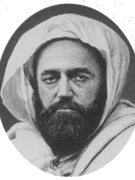|
|
 |
Amir ‘Abd al-Qādir al-Jazā’irī (1808-1883), is an important figure in Algerian history. He was a shareef, a descendent of the Prophet Muhammad, and a Berber of the Banu Ifran tribe. Amir ‘Abd al-Qādir (alt. spellings: Emir Abd el-Kader, Emir Abdel Kader) was trained from a young age in Islamic sciences, and he became a scholar with knowledge of both the exoteric and esoteric (i.e. Sufism) dimensions of Islam. His father was a shaykh of the Qadiri Sufi Order. After the invasion of the French colonial power in Algeria in 1830, Amir ‘Abd al-Qādir became the most important leader of the rebellion against the invaders. After years of victories, he was finally captured and exiled to France, and later to Damascus. There, Amir ‘Abd al-Qādir resumed his scholarly pursuits, writing books on theology and philosophy, but always with a mystical bent. Today, he is considered one of the major heroes in ultimately winning Algerian independence, and his spiritual writings are held in considerable esteem.
A poem composed by the Amir ‘Abd al-Qādir, titled “The Life of the Nomad”, appeared in the Spring 1976 issue of Studies.
|
|
|
|
 |
Mouse over this icon to see the abstract of the article. |
• Click on the header on any column to sort.
• Click on an issue listing (e.g. "Vol. 1, No. 1. ( Winter, 1967)" ) to see the full contents of only that issue.
|
| Article |

This poem, translated from Arabic to English, from the great Algerian freedom-fighter and Sufi, the Amir ‘Abd al-Qadir, is not overtly spiritual, but is a good example of traditional Arab and Muslim poetry showing reverence for the virile life of the nomad and his closeness to and intense awareness of the beauty and power of nature.
| The Life of the Nomad | ‘Abd al-Qadir, Amir | |
Vol. 10, No. 2. ( Spring, 1976)
| Islam |
|
1 entries
(Displaying results 1 - 1)
|
View : |
|
 |
Loading... |
|
Page:
[1]
of 1 pages
|
|
|
|